Diplomatic Bluebook 2024
Chapter 2
Resilient and Unwavering Regional Diplomacy
4 Southeast Asia
(1) Indonesia
Indonesia is a major country in the Southeast Asia region with the fourth largest population in the world (at approximately 270 million people) and situated in a strategic location on sea lanes such as the Strait of Malacca. Indonesia plays a leading role in the Association of Southeast Asian Nations (ASEAN) (Indonesia was the ASEAN Chair for 2023) and has often been taking the initiative in efforts to address various challenges in the regional and international community while serving as the sole G20 member from ASEAN.
President Joko's second administration, which started in October 2019, is a stable administration where the ruling parties coalition occupies approximately 82% of the seats in the House of Representatives. This administration's priorities are (a) infrastructure development, (b) human resources development, (c) investment promotion, (d) bureaucratic reforms, and (e) appropriate execution of the state budget. Due to the impacts of COVID-19, Indonesia's economic growth rate, which had been maintained consistently at around 5% until then, recorded negative growth in 2020, but returned to positive growth of 5.3% in 2022. Japan is actively promoting cooperation in infrastructure development and human resources development, which are priorities of the second Joko administration.
2023 marked the 65th anniversary of the establishment of diplomatic relations between Japan and Indonesia. In May, President Joko Widodo visited Japan on the occasion of the G7 Hiroshima Summit and held a bilateral summit meeting, and in September Prime Minister Kishida visited Indonesia on the occasion of the ASEAN-related Summit Meetings and held a bilateral summit meeting. At the September Summit Meeting, in light of the comprehensive and continued developments of the Japan-Indonesia Strategic Partnership and in commemoration of the 65th anniversary of the Indonesia-Japan diplomatic relations as well as the 50th Year of ASEAN-Japan Friendship and Cooperation, the two leaders concurred to elevate the partnership to a Comprehensive Strategic Partnership. In December, President Joko visited Japan and, together with Prime Minister Kishida, co-chaired the Commemorative Summit for the 50th Year of ASEAN-Japan Friendship and Cooperation, and the two leaders also had a bilateral summit meeting and confirmed an agreement in principle on the substantially concluded negotiations to amend the Japan-Indonesia Economic Partnership Agreement. In March, Foreign Minister Hayashi held a Foreign Ministers' Meeting (Japan-Indonesia Ministerial-Level Strategic Dialogue) with Minister for Foreign Affairs Retno L.P. Marsudi, who was visiting Japan as a guest of the Ministry of Foreign Affairs, and in September Foreign Minister Kamikawa held a Foreign Ministers' Meeting on the occasion of the UN General Assembly. At these summit meetings and foreign ministers' meetings, both countries closely exchanged views on the strengthening of bilateral relations as well as cooperation in addressing various issues in the region and the international community (See the Column on page 73).
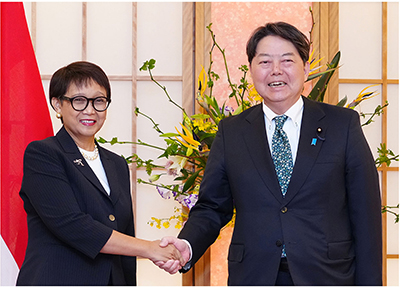 Japan-Indonesia Foreign Ministers' Meeting (March 6, Tokyo)
Japan-Indonesia Foreign Ministers' Meeting (March 6, Tokyo) Their Majesties the Emperor and Empress responding to the media with President Joko and the First Lady at Bogor Palace (June 19, Bogor, Indonesia; Photo: Indonesian Presidential Palace)
Their Majesties the Emperor and Empress responding to the media with President Joko and the First Lady at Bogor Palace (June 19, Bogor, Indonesia; Photo: Indonesian Presidential Palace)Following a long-standing invitation, Their Majesties the Emperor and Empress visited Indonesia from June 17 to 23 as their first international goodwill visit since the accession to the Throne. The year 2023 was a historic milestone, marking not only the 65th anniversary of the establishment of the diplomatic relations between Japan and Indonesia, but also the 50th Year of ASEAN-Japan Friendship and Cooperation. The visit by Their Majesties to Indonesia in such a memorable year demonstrated to Japan and beyond the deep friendly relations between the two countries.
Their Majesties received a grand welcome from President Joko Widodo and the First Lady, as well as officials of the Government of Indonesia, at a welcoming event and Luncheon at Bogor Palace. Before the Luncheon, President Joko himself drove a cart for Their Majesties to Bogor Botanical Garden, which Their Majesties the Emperor Emeritus and Empress Emerita also had visited in 1991. Their Majesties received a cordial welcome as the President and First Lady guided them around the garden. Their Majesties also met and talked about exchanges between the two countries with local Japanese residents and Indonesians with ties to Japan, and had friendly exchanges with the younger generation via a visit to Darma Persada University and a vocational high school.
His Majesty the Emperor is deeply interested in water issues and visited related facilities such as the Pluit Pumping Station in Jakarta, which was developed with Japanese cooperation, and the Sabo Technical Center in the ancient city of Yogyakarta, where he enthusiastically spoke about issues such as flood control with those involved. In Yogyakarta, His Majesty received a warm welcome from Sultan Hamengku Buwono X, the Governor of Yogyakarta Special Region, whom Their Majesties the Emperor Emeritus and Empress Emerita met in 1991, and other members of the Sultanate of Yogyakarta. His Majesty also visited Borobudur Temple, a World Heritage Site located near Yogyakarta.
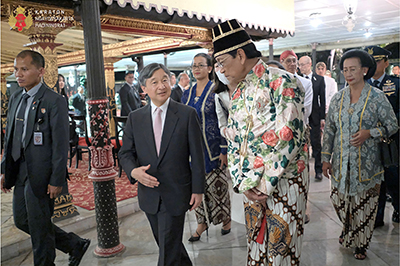 His Majesty the Emperor heads to the banquet venue with Sri Sultan Hamengku Buwono X (the Governor of Yogyakarta Special Region) at Kraton Palace (June 21, Yogyakarta, Indonesia; Photo: Kraton Palace of Yogyakarta)
His Majesty the Emperor heads to the banquet venue with Sri Sultan Hamengku Buwono X (the Governor of Yogyakarta Special Region) at Kraton Palace (June 21, Yogyakarta, Indonesia; Photo: Kraton Palace of Yogyakarta)During the visit, Their Majesties received a warm welcome at various locations not just from officials of the Government of Indonesia, but also by the Indonesian people at large, as they waved the national flags of both countries. This visit provided an opportunity to reaffirm the history of exchanges and cooperation between Japan and Indonesia, and to further deepen the friendly and cooperative relationship that both countries have cultivated over the years, including through exchanges with the younger generation. It is expected to play a bridging role between the two countries.
(2) Cambodia
Cambodia, located in the Mekong region, is a key country in strengthening connectivity and narrowing the development gap in the region. Cambodia had been averaging approximately 7% growth for the past 20 years, and, although GDP growth in 2020 was negative due to the impacts of COVID-19, in 2022 it returned to positive growth at 5.0%.
In terms of domestic affairs, the general election held in July saw the ruling Cambodian People's Party win a landslide victory after the Candlelight Party, which had become the largest opposition party in the 2022 commune council elections, was denied the right to register its candidates. Hun Sen, who had served as Cambodia's Prime Minister for many years, stepped down from his post, and a new Cabinet headed by Prime Minister Hun Manet was formed in August 2023.
Japan has cooperated with Cambodia's peace, reconstruction, and development efforts, including in the first full-scale deployment of UN peacekeeping operations (PKO) in 1992. Moreover, in recent years, investment by Japanese companies has progressed smoothly and economic relations have expanded, and cooperation is also progressing in new fields such as security and digital technologies.
2023 marks the 70th anniversary of the establishment of diplomatic relations between Japan and Cambodia, and the relationship between the two countries has been elevated to a Comprehensive Strategic Partnership (See the Column on page 75). In September, Prime Minister Kishida and Prime Minister Hun Manet held their first Summit Meeting in Jakarta, Indonesia, and the two leaders also met again during the ASEAN-Japan Commemorative Summit that was held in Tokyo in December. At that time, the two leaders concurred on the list of cooperation items in the digital area that Japan proposed to the Cambodian side as the Co-Creation for Common Agenda Initiative, which was newly introduced in the Development Cooperation Charter approved by the Cabinet in June, and also confirmed their intention to accelerate cooperation in improving communication networks and cybersecurity measures, which are essential for the development of the digital economy, and attended signing ceremonies for seven bilateral cooperation documents, including in digital and energy areas. Furthermore, at the Foreign Ministers' Meeting in January, the Foreign Ministers' telephone call in October, and the Foreign Ministers' Meeting in December, the two ministers confirmed that Japan and Cambodia would cooperate in the regional and international arenas.
Japan and Cambodia established diplomatic relations in 1953. The following year, in 1954, Cambodia renounced its right to claim reparations from Japan for World War II, and in 1955 Japan invited His Majesty King Sihanouk (Prime Minister and Minister of Foreign Affairs) as a State Guest, passed a resolution of gratitude in the House of Representatives, and signed the Treaty of Amity between Japan and Cambodia.
Subsequently, there were periods when exchanges stagnated under the Khmer Rouge regime and during the civil war, but since the late 1980s, Japan's significant involvement in Cambodia's peace process has allowed the two countries to build a strong foundation of trust. Japan has contributed to Cambodia's nation building and reconstruction through the first deployment of Japan Self-Defense Forces in the UN Peacekeeping Operations (PKO) and development cooperation in diverse fields such as backbone infrastructure. Cambodia's 500 Riel banknote features the Kizuna Bridge and the Tsubasa Bridge, which were built with the support of the Government of Japan, along with the Japanese flag. In recent years, alongside Cambodia's economic growth, private sector investment has flourished and people-to-people exchanges have expanded in various fields, further deepening the relationship between the two countries.
In 2023, the 70th anniversary of the establishment of diplomatic relations, Japan-Cambodia relations were upgraded to a “Comprehensive Strategic Partnership,” and the public and private sectors worked together to carry out numerous commemorative events. To ensure that the 70th commemorative events were fruitful, an Executive Committee was established with the Ministry of Foreign Affairs and International Cooperation of Cambodia and the Embassy of Japan in Cambodia taking the lead to coordinate closely. For the commemorative logo, the design by Sroeun Menglong was selected from among the many entries that were submitted. His design is based on the red and blue of the two countries' national flags, with the number 7 featuring a design known as “Jahva” that is used as a part of the roofs of Cambodian temples, and the number 0 featuring cherry blossoms (Sakura), Japan's national flower, inside, and the design was well received. The National Bank of Cambodia also issued a commemorative coin with the logo. In addition, about 70 commemorative events were carried out by private organizations in Cambodia.
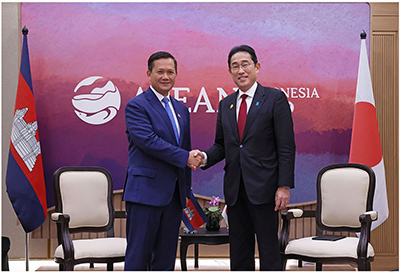 Japan-Cambodia Summit Meeting (September 7, Indonesia; Photo: Cabinet Public Affairs Office)
Japan-Cambodia Summit Meeting (September 7, Indonesia; Photo: Cabinet Public Affairs Office)On January 9, the anniversary of the establishment of diplomatic relations, Prime Minister Kishida exchanged congratulatory messages with Prime Minister Hun Sen and Foreign Minister Hayashi with Deputy Prime Minister and Minister of Foreign Affairs and International Cooperation Prak Sokhonn. Furthermore, later that month Deputy Prime Minister and Minister of Foreign Affairs and International Cooperation Prak Sokhonn visited Japan as a guest of the Ministry of Foreign Affairs and a meaningful Foreign Ministers' Meeting was held. In September, a Japan-Cambodia Summit Meeting was held between Prime Minister Kishida and Prime Minister Hun Manet, who took office in August.
 Kizuna Festival (February 23, Phnom Penh, Cambodia)
Kizuna Festival (February 23, Phnom Penh, Cambodia)In February, the Kizuna Festival, Cambodia's largest event for introducing Japanese culture, was held, and singer and actress MINAMINO Yoko, serving as the goodwill ambassador from Japan for the “70th anniversary of Japan-Cambodia friendship,” shared the stage with artist, song-writer and producer Laura Mam, the goodwill ambassador from Cambodia, thereby further enhancing the momentum for promoting friendship. The Embassy of Japan in Cambodia also held a Japanese speech contest, a Tanabata festival, and an orchestra performance to introduce Japanese culture and foster familiarity with Japan, all of which were great successes. Additionally, in cooperation with the media and academic institutions, Ambassador of Japan to Cambodia Ueno also gave a number of lectures on Japan-Cambodia relations. With the closing reception held in December, the 70th anniversary commemorative events closed as a resounding success. Japan will continue to work to further deepen the bilateral relationship as well as the bonds between the peoples of the two countries, which were strengthened throughout the year.
(3) Singapore
Singapore is the most economically advanced country within ASEAN. Based on its omnidirectional foreign policy, the country maintains friendly relations with major countries including the U.S. and China.
In Singapore, the People's Action Party (PAP), led by Prime Minister Lee Hsien Loong, holds more than 90% of the seats from the 2020 general elections, and, with the basis of a stable political situation, has been pursuing policies to address the aging population, unemployment, and housing. In April 2022, the PAP chose Minister of Finance Lawrence Wong as a candidate for the next Prime Minister. In November 2023, Prime Minister Lee Hsien Loong announced that he would step down and hand over power to Minister of Finance Wong by November 21, 2024, the 70th anniversary of the PAP.
Regarding Japan-Singapore relations, Prime Minister Kishida visited Singapore in May, and Prime Minister Lee Hsien Loong visited Japan in December during the ASEAN-Japan Commemorative Summit, following mutual visits between the leaders of Japan and Singapore since the previous year. On these occasions, summit meetings were held, and views were exchanged on further strengthening bilateral relations and on the various issues facing the region and the international community. The Agreement between the Government of Japan and the Government of the Republic of Singapore concerning the Transfer of Defense Equipment and Technology was also signed in June.
The two countries have worked together to provide developing countries with technical assistance through the “Japan-Singapore Partnership Program for the 21st Century (JSPP21),” which was signed in 1997. To date, they have provided approximately 410 training courses with roughly 7,400 participants from ASEAN countries and other regions (as of the end of December 2023). The Japan Creative Centre (JCC), which was opened in Singapore in 2009 as a platform to promote Japanese culture, hosted a variety of outreaches and events.
(4) Thailand
Thailand is one of the original member states of ASEAN, which was born from the “Bangkok Declaration” in 1967. It is located in the center of the Mekong region and is a geopolitically important country. Thailand has become a major production center for Japanese companies, including the automobile industry, and today Thailand is an indispensable part of the Japanese economy as a part of the global supply chain, with close to 6,000 Japanese companies operating in Thailand and more than 70,000 Japanese nationals living in Thailand.
2023 was a year of major changes in Thailand's domestic politics. Following the dissolution of the lower house of the National Legislative Assembly in March, a lower house election was held in May. As a result of the election, the former ruling and opposition parties formed a coalition framework before the election, Prime Minister Srettha Thavisin was elected from the Pheu Thai Party of former Prime Minister Thaksin Shinawatra, and a new government was inaugurated in September. Subsequently, high-level exchanges between Japan and Thailand were actively conducted to build relations with the new government. In October, Foreign Minister Kamikawa visited four Southeast Asian countries, including Thailand (along with Brunei, Viet Nam, and Laos) on her first bilateral visit since assuming her position, and met with Deputy Prime Minister and Minister of Foreign Affairs Parnpree Bahiddha-nukara. In November, on the occasion of the APEC Leaders' Meeting that was held in San Francisco, U.S., Prime Minister Kishida held his first Summit Meeting with Prime Minister Srettha since the inauguration of the new administration in Thailand, and then once again met with Prime Minister Srettha when he visited Japan in December to attend the ASEAN-Japan Commemorative Summit, and the two leaders confirmed the strengthening of cooperation between the two countries in the economic field.
(5) Timor-Leste
Timor-Leste, the first country that achieved independence in the 21st century, is strategically important in the Indo-Pacific region, and is situated in a critical sea lane between Australia and Indonesia. Japan established diplomatic relations with Timor-Leste upon its independence in 2002. In 2022, the country celebrated the 20th anniversary of its independence, has realized peace and stability with the support of the international community, and has been building the nation based on democracy. Elections for the National Parliament were held in May 2023, and a new government led by Prime Minister Kay Rala Xanana Gusmão was inaugurated in July. As its economy is highly dependent on natural resources such as petroleum and natural gas, the country has been working on industrial diversification as a matter of the highest national priority. On the diplomatic front, Timor-Leste is continuing to work in coordination with relevant countries toward joining ASEAN and the WTO, and in May, ASEAN adopted a roadmap for Timor-Leste's accession to ASEAN.
In July, State Minister for Foreign Affairs TAKEI Shunsuke became the first foreign ministerial-level official to visit Timor-Leste since the inauguration of the new Gusmão administration. During his visit, he conveyed his congratulations to Prime Minister Gusmão on assuming the office of Prime Minister and paid courtesy calls to President Jose Ramos-Horta and others. In September, Prime Minister Kishida held informal talks with Prime Minister Gusmão on the occasion of the ASEAN-related Summit Meetings, and conveyed that Japan would continue to support Timor-Leste's efforts to join ASEAN. In December, Prime Minister Kishida held a Summit Meeting with Prime Minister Gusmão, who was visiting Japan for the ASEAN-Japan Commemorative Summit, and expressed his intention to upgrade the bilateral relationship to a “Comprehensive Partnership toward Sustainable Growth and Development” and to further promote it. Additionally, in July, Foreign Minister Hayashi held a Foreign Ministers' Meeting with Minister of Foreign Affairs and Cooperation Bendito dos Santos Freitas, where the two ministers exchanged views on bilateral relations and on various issues in the region and the international community. Japan has continued to support Timor-Leste since even before its independence, and has maintained good relations with the country. In August, the United Nations Development Program (UNDP) and the Government of Japan signed an Exchange of Notes on grant aid for the national broadcasting station in Timor-Leste, and in September, Kochi Prefecture began accepting technical intern trainees from Timor-Leste for the first time.
(6) The Philippines
The Philippines is a maritime nation situated at a strategic point on sea lanes, and shares strategic interests with Japan. Although the Philippines' economy experienced negative growth in 2020 due to the impact of COVID-19, in 2022 the country's economy recorded a growth rate of 7.6%, its highest in the past 46 years, making it one of the fastest growing economies in Asia and the world. Now in his second year in office, President Ferdinand Marcos Jr. continues to prioritize improving the quality of lives of the people through food, education, health, employment, and social security, as well as investments in public infrastructure. As for the Mindanao Peace Process, despite the delays seen in the decommissioning and disarmament work with the Moro Islamic Liberation Front (MILF), based on the amended Bangsamoro Organic Law, the effort to conceive an autonomous government is continuing toward 2025. In July, President Marcos Jr. lifted the national state of emergency in the Mindanao region.
Since President Marcos's visit to Japan in February, there have been numerous high-level visits between Japan and the Philippines, and the strategic partnership is being further strengthened. In November, Prime Minister Kishida visited the Philippines for the first time since assuming the office of Prime Minister and held a Summit Meeting with President Marcos, and also delivered a policy speech to a joint session of the Philippine Senate and House of Representatives, which was the first such speech by a Prime Minister of Japan. In terms of security, the two countries signed and exchanged notes on the provision of a coastal radar system, which is the first Official Security Assistance (OSA) programme to be implemented since the establishment of OSA (See the Special Feature on page 219), and also concurred to begin negotiations on a Japan-Philippines Reciprocal Access Agreement (RAA). Furthermore, with regard to economics and people-to-people exchanges, the 14th Meeting of the Japan–Philippines High Level Joint Committee on Infrastructure Development and Economic Cooperation was held in August, where there were discussions on how to strongly support the Philippines' entry into the upper-middle income states and its “Built, Better, More” infrastructure policy. In addition to these kinds of bilateral cooperation, Japan-U.S.-Philippines trilateral cooperation is also making strides, with discussions underway to solidify Japan-U.S.-Philippines cooperation, such as through the Trilateral Meeting Between the National Security Advisors of the U.S., Japan, and the Philippines in June; the Japan-U.S.-Philippines Foreign Ministers' Meetings in July and September; and the Japan-U.S.-Philippines leader's level informal talks in September.
(7) Brunei
Its abundance in natural resources has enabled Brunei to realize a high economic standard and generous social welfare, and as such, the country enjoys political and economic stability. Under Brunei's constitutional monarchy, the Sultan concurrently serves as the Prime Minister, Minister of Finance and Economy, Minister of Defense and Minister of Foreign Affairs. Located in the center of Southeast Asia, Brunei is one of the countries involved in the issue of the South China Sea and has adopted a balanced diplomacy built on the pillar of promoting ASEAN unity and centrality.
Brunei's economy is supported by natural gas production and oil refining ventures, but the Government of Brunei is aiming for economic diversification to avoid overreliance on energy resources.
Japan and Brunei established diplomatic relations in 1984, and the two countries are developing excellent bilateral relations in various areas. In October, Foreign Minister Kamikawa visited Brunei, where she had an audience with His Majesty Sultan Haji Hassanal Bolkiah Mu'izzaddin Waddaulah ibni Al-Marhum Sultan Haji Omar ‘Ali Saifuddien Sa'adul Khairi Waddien; she also held a Japan-Brunei Foreign Ministers' Meeting with Minister for Foreign Affairs II Dato Seri Setia Haji Erywan bin Pehin Datu Pekerma Jaya Haji Mohd Yusof, and at the Foreign Ministers' Meeting, the two ministers exchanged views on bilateral cooperation and on various issues facing the region and the international community. In December, Prime Minister Kishida held a Summit Meeting with His Majesty Sultan Bolkiah, who was visiting Japan for the ASEAN-Japan Commemorative Summit, and exchanged views on deepening bilateral relations in anticipation of the 40th anniversary of the establishment of diplomatic relations between the two countries in 2024. Japan and Brunei are also continuing to build a close relationship between the imperial and royal families. Brunei is an important country for the stable energy supply to Japan. Around 70% of Brunei's liquefied natural gas (LNG) exports are bound for Japan, and LNG from Brunei makes up around 5% of the total LNG import to Japan.
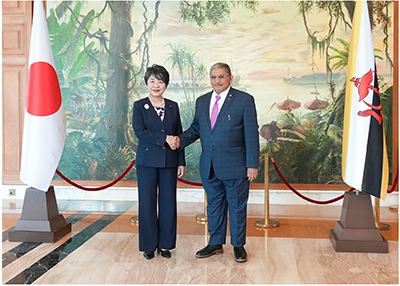 Japan-Brunei Foreign Ministers' Meeting (October 9, Brunei)
Japan-Brunei Foreign Ministers' Meeting (October 9, Brunei)(8) Viet Nam
Located next to sea lanes in the South China Sea and sharing a long border with China, Viet Nam is a geopolitically important country. Given that the country embraces the third largest population in Southeast Asia, and is experiencing a surge in the number of people in middle-income brackets, Viet Nam is a promising market. At the same time, since the COVID-19 pandemic, the movement to diversify supply chains has been gaining momentum, and foreign firms, including Japanese companies, have continued moving their production bases to Viet Nam. The country is promoting GX (Green Transformation) and DX (Digital Transformation) with the aim of joining the ranks of developed countries by 2045 and of becoming carbon neutral by 2050, and is currently striving to achieve stable economic growth through the stabilization of the macroeconomy including control of inflation, the promotion of foreign investment by the development of infrastructure and the improvement of the investment environment. Viet Nam's economic growth rate from 2020 to 2021 fell to around the 2% level due to severe lockdowns caused by the spread of COVID-19, but, in 2022, it achieved an economic growth rate of 8.02% due to the shift to a “living with COVID-19” policy. Viet Nam's economic growth rate in 2023 is expected to be between 4.7% and 5.8%.
Japan and Viet Nam established diplomatic relations on September 21, 1973, and in 2023, the 50th anniversary of the establishment of diplomatic relations, there were numerous visits by dignitaries, including visits to Japan by President Vo Van Thuong and his wife and by Prime Minister Pham Minh Chinh (See the Column on page 79). In November, when President Thuong visited Japan, the two countries, which have been advancing cooperation in various fields, concurred to elevate the Viet Nam-Japan relationship to a “Comprehensive Strategic Partnership for Peace and Prosperity in Asia and the World,” and issued a Joint Statement. At the Summit Meeting, the two leaders confirmed (a) the promotion of cooperation in the security field through defense exchanges, defense equipment and technology transfers, and Official Security Assistance (OSA), as well as further strengthening cooperation in the field of maritime security; (b) the promotion of cooperation in the fields of Asia Zero Emission Community (AZEC), GX, and DX; cooperation in strengthening the resilience of supply chains through the development of supporting industries; and the expansion of the investment environment; (c) the promotion of cooperation to develop high-quality human resources and to resolve issues surrounding Vietnamese technical intern trainees, workers, and students. In addition, with regard to regional and international issues, the two leaders emphasized the importance of the principles of a free and open international order based on the rule of law and upholding the UN Charter. Regarding people-to-people exchanges, more than 500 commemorative events were held in both countries to commemorate the 50th anniversary of the establishment of diplomatic relations between Japan and Viet Nam. In addition to the two countries respectively holding Viet Nam festivals and Japan festivals, in September “Princess Anio,” an opera celebrating the 50th anniversary of Japan-Viet Nam diplomatic relations and based on the love story between Nagasaki merchant ARAKI Sotaro and Princess Ngoc Hoa, premiered in Viet Nam, and then in November a premiere performance was held in Japan. Furthermore, the number of Vietnamese residing in Japan, primarily technical intern trainees, is continuing to increase, from approximately 40,000 in 2011 to over 520,000 by the end of June 2023, making Vietnamese nationals the second largest number of foreign residents in Japan by country after China. With the Treaty between Japan and the Socialist Republic of Viet Nam on Mutual Legal Assistance in Criminal Matters also taking effect in August 2022, cooperation in the field of mutual criminal assistance is also progressing even further.
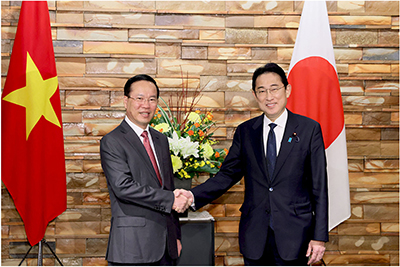 Japan-Viet Nam Summit Meeting (November 27, Tokyo; Photo: Cabinet Public Affairs Office)
Japan-Viet Nam Summit Meeting (November 27, Tokyo; Photo: Cabinet Public Affairs Office)The year 2023 marks the 50th anniversary of the establishment of diplomatic relations between Japan and Viet Nam. Since Japan and Viet Nam established diplomatic relations in September 1973, the relationship between the two countries has become closer than ever, and is now developing further in all areas, including politics, economy, and people-to-people exchanges.
Dating back, the friendly relationship between Japan and Viet Nam has been cultivated over a long history of exchanges that spans more than a thousand years. The first exchange began in the eighth century, when a Vietnamese Buddhist monk visited Japan. From the 16th to 17th century, trade routes were opened and the city of Hoi An, located in central Viet Nam, prospered as an international trading port, with visits by many trade vessels from Japan. A Japanese town was also built and flourished, with Japanese merchants living there. During the Đông Du (go-to-east-for-study) movement in the 19th century, many Vietnamese people came to Japan to study, and a strong friendship was fostered between the peoples of the two countries.
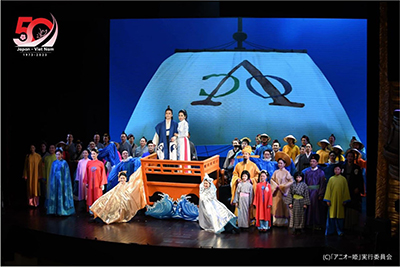 A performance of the new opera Princess Anio, which commemorates the 50th anniversary of the establishment of diplomatic relations between Japan and Viet Nam (September, Hanoi, Viet Nam; Photo: Princess Anio Project Executive Committee)
A performance of the new opera Princess Anio, which commemorates the 50th anniversary of the establishment of diplomatic relations between Japan and Viet Nam (September, Hanoi, Viet Nam; Photo: Princess Anio Project Executive Committee)As such, exchanges between Japan and Viet Nam have been built over many years, and in recent years there have been a remarkable number of people-to-people exchanges. In 2012, there were about 50,000 Vietnamese people in Japan, and by 2022, this number had increased tenfold to about 500,000 Vietnamese people in Japan, spanning a diverse range of occupations, including technical intern trainees, people with specific skills, students, and nurses and care worker candidates under the Japan-Viet Nam Economic Partnership Agreements (EPA). With the declining birthrate and aging population in Japan, Vietnamese human resources are helping to support Japan's economy and society and are making great contributions. Currently, there are about 20,000 Japanese residents living in Viet Nam, working hand-in-hand with Vietnamese people and living lives that seamlessly blend into their local communities. Furthermore, there is very active traffic between the two countries: in 2019, about one million Japanese tourists visited Viet Nam, and about 500,000 Vietnamese tourists visited Japan. Thanks to this, Japanese manga and anime are popular among young people in Viet Nam, and Japanese foods such as sushi and yakitori are also popular, making Japan a familiar country to many Vietnamese people. In 2023, many cultural exchange events were also held in commemoration of the 50th anniversary, thereby providing even more opportunities to learn more about each other's culture for Japanese and Vietnamese people.
High-level visits between the two countries have also frequently been taking place since Prime Minister Vo Van Kiet's visit to Japan in 1993. In 2017, Viet Nam was the last country that Their Majesties the Emperor Emeritus and Empress Emerita visited as Their Majesties the Emperor and Empress.
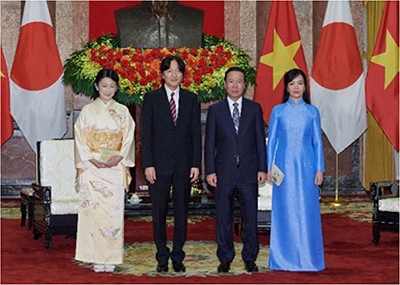 Their Imperial Highnesses Crown Prince and Crown Princess Akishino taking a commemorative photo with President Vo Van Thuong and his spouse (September, Hanoi, Viet Nam; Photo: Imperial Household Agency)
Their Imperial Highnesses Crown Prince and Crown Princess Akishino taking a commemorative photo with President Vo Van Thuong and his spouse (September, Hanoi, Viet Nam; Photo: Imperial Household Agency)In 2023, Japan was visited by President Vo Van Thuong and his spouse (on an Official Visit in November) and Prime Minister Pham Minh Chinh (for the G7 Outreach Meeting in May and for the Commemorative Summit for the 50th Year of ASEAN-Japan Friendship and Cooperation in December). Many dignitaries from Japan also visited Viet Nam in 2023, including Their Imperial Highnesses Crown Prince and Crown Princess Akishino (September), President of the House of Councillors OTSUJI Hidehisa (September), and Foreign Minister Kamikawa (October).
These exchanges at various levels have continued to deepen the trust between Japan and Viet Nam. The existence of people at a wide range of levels who are passionate about cooperating for the sake of both countries and about deepening the countries' friendship is a major driving force behind the development of relations between the two countries.
The relationship between Japan and Viet Nam has become one in which both countries truly need each other based on trust and friendship that have been built up over many years. 2023 is therefore a year to affirm the bonds between Japan and Viet Nam so as to build another 50 years of friendly relations.
(9) Malaysia
Comprised of the Peninsular Malaysia of the Malay Peninsula and the East Malaysia of Borneo, Malaysia is a geopolitically important country facing the South China Sea and the Strait of Malacca that is situated in a crucial spot in the Indian and Pacific Oceans. Furthermore, it is a federal state comprised of 13 states and three federal territories, and also a multiethnic state comprised of Bumiputra (Malay including indigenous peoples) (70%), Chinese (23%) and Indian people (7%), among others.
The Anwar administration, which took office after the general election in November 2022, has shown an emphasis on the economy, with Prime Minister Dato' Seri Anwar himself serving as Minister of Finance, and is pursuing Malaysia's traditional omnidirectional diplomacy in foreign affairs.
In November 2023, Prime Minister Kishida visited Malaysia for the first time since assuming the office of Prime Minister and held a Summit Meeting with Prime Minister Anwar. In December, Prime Minister Kishida held another Summit Meeting with Prime Minister Anwar, who was visiting Japan for the ASEAN-Japan Commemorative Summit, and the two leaders concurred to elevate Japan-Malaysia relations to a Comprehensive Strategic Partnership.
In the field of human resources development, through the Look East Policy, which was begun by Prime Minister Mahathir bin Mohamad in 1982, more than 26,000 Malaysian people have studied or have been trained in Japan so far. The two countries have been cooperating in making the Malaysia Japan International Institute of Technology (MJIIT), which was opened in September 2011, a base for Japanese-style engineering education in ASEAN countries. In addition, in order to further contribute to the development of human resources who will bear the future of Malaysia, preparations are being made to establish a branch campus of the University of Tsukuba in Malaysia, and, if realized, it will be the first overseas branch campus to be established by a Japanese university. On the economic front, roughly 1,600 Japanese companies have been operating in Malaysia, which demonstrates a continued close relationship between the two countries.
(10) Myanmar
Since the coup d'état by the Myanmar military on February 1, 2021, many civilians have died as a result of armed suppression by the Myanmar military, and in some areas, there have been intermittent clashes between the Myanmar military and ethnic armed organizations, the People's Defense Forces (PDF) and others. On the political front, the Political Parties Registration Law was announced in January, and in March, the registration for the National League for Democracy (NLD) led by Aung San Suu Kyi was virtually cancelled. Additionally, the state of emergency, which was supposed to last for two years after the coup d'état, has been extended twice (until January 31, 2024), and the situation is deteriorating.
On February 1, 2023, two years after the coup d'état, the Government of Japan released a statement by Foreign Minister Hayashi that expressed serious concerns that the state of emergency had been extended without taking steps toward achieving political progress, such as the release of all detainees, and once again strongly urged the Myanmar military to take concrete actions to immediately stop the violence, release those who are detained, and swiftly restore Myanmar's democratic political system. Furthermore, when the NLD was deregistered, the Government of Japan released a statement by the Ministry of Foreign Affairs Press Secretary expressing serious concern that the military's actions go against a peaceful resolution of the situation, which Japan has consistently called for, and will make it even more difficult to improve the situation.
In order to break through the current situation, Japan has been cooperating with the international community and giving maximum support to ASEAN's efforts, including Indonesia, as ASEAN Chair, based on the belief that it is important to achieve concrete results, especially ASEAN's “Five-Point Consensus.”28
At the UN, Japan has been cooperating with the international community by co-sponsoring a resolution at the Human Rights Council on the human rights situation in Myanmar in April and by co-sponsoring a resolution at the UN General Assembly in December.
So far, in order to improve the humanitarian situation in Myanmar, which continues to deteriorate, the Government of Japan has actively provided humanitarian assistance that directly benefits the people of Myanmar. Since the coup d'état on February 1, 2021, Japan has provided more than 109.5 million U.S. dollars in humanitarian assistance (as of the end of December 2023). On February 28, the Government of Japan decided to provide additional humanitarian assistance totaling approximately 60.3 million U.S. dollars through the United Nations High Commissioner for Refugees (UNHCR) and other international organizations to provide food, medical supplies, shelter, and water and sanitation infrastructure to people in Myanmar in need.
- 28 The Five-Point Consensus was announced at the ASEAN Leaders' Meeting held on April 24, 2021. It calls for (1) immediate cessation of violence, (2) commencement of constructive dialogue among all parties concerned, (3) mediation of the dialogue process by a special envoy of the ASEAN Chair, (4) providing humanitarian assistance through the AHA Centre, and (5) visiting Myanmar to meet with all parties concerned by the ASEAN special envoy and delegation.
(11) Laos
Laos is a landlocked country bordering China, Myanmar, Thailand, Cambodia, and Viet Nam, and therefore is a key country for Mekong connectivity. In 2023, Prime Minister Sonexay Siphandone continued to address economic and fiscal issues on the domestic front, and, at the 6th Ordinary Session of the National Assembly's 9th Legislature held in October, he stated that he would continue to implement measures to stabilize the macroeconomy, control inflation to prevent an economic crisis, and stabilize prices and living costs. He also stated that Laos has both public debt and publicly guaranteed debt, and that the country is committed to continuing to repay its debts, particularly its external debts, and to prevent a default.
In May, President Thongloun Sisoulith visited Japan for a Summit Meeting, and Deputy Prime Minister and Minister of Foreign Affairs Saleumxay Kommasith also met with Foreign Minister Hayashi. In October, Foreign Minister Kamikawa visited Laos, and in November, Deputy Prime Minister and Minister of Foreign Affairs Saleumxay visited Japan, and a Japan-Laos Foreign Ministers' Meeting was held on each occasion. At both meetings, it was confirmed that the “Strategic Partnership” between the two countries would be further expanded in anticipation of the 70th anniversary of the establishment of diplomatic relations between Japan and Laos in 2025. During Deputy Prime Minister and Minister of Foreign Affairs Saleumxay's visit to Japan in November, the two ministers signed and exchanged notes concerning Japan's Cultural Grant Assistance up to the amount of 4.171 billion yen for “the Project for the Reconstruction of the Chao Anouvong Stadium.” In December, Prime Minister Kishida met with Prime Minister Sonexay Siphandone, who was visiting Japan for the ASEAN-Japan Commemorative Summit, and exchanged views on cooperation toward 2024 when Laos will hold the ASEAN Presidency and on deepening bilateral relations toward the 70th anniversary of the establishment of diplomatic relations between Japan and Laos in 2025.



